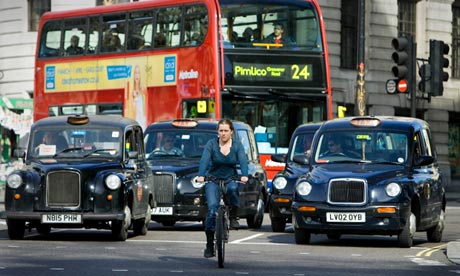
It was a mantra heard time and again amid the cosy fug of 2012's British sporting success: with a Tour de France title, another clutch of Olympic golds and Bradley Wiggins our sports personality of the year, we were now officially a nation of cyclists.
Except we're not. Exclude racing or tourism and Britons are near the bottom of just about every European cycling ranking. Just 2.2% of people use a bike as their main means of transport, lower than all but a handful of EU nations such as Bulgaria, Malta and Cyprus.
Other statistics are equally damning. About 2% of British children ride to school, compared with 40% in Denmark and 20% in Sweden. Almost three-quarters of British cyclists are men, a statistic that speaks of a macho, gung-ho cycling culture where riders are expected to mix it with speeding cars, buses and trucks.
"When it comes to cycling as everyday transport the UK is so far down the table it's almost scary," said Kevin Mayne, director of development at the Brussels-based European Cyclists' Federation. "With all these Olympic medals people maybe have this idea that the UK is doing OK in cycling. But it's not."
And yet cycling advocates hope things could be about to change. This week is the start of a pioneering parliamentary inquiry into how best to get Britons on their bikes, building on the momentum from last summer's sporting triumphs and an energetic cycle safety campaign by the Times. All three main party leaders have signed up. Expectations are growing that Downing Street could be on the verge of making a significant commitment.
"It's all to play for," said Roger Geffen, policy director of national cycling lobby group the CTC and among those giving evidence to the all-party parliamentary cycling group (APPCG) of MPs and peers, which has organised the hearings. "The inquiry is hugely timely and hopefully it paves the way for some sort of high-level announcement from government."
The first of the inquiry's six evidence sessions starts on Wednesday, taking the views of experts, government departments, cycling luminaries such as the Olympic champion-turned bike builder Chris Boardman and members of the media, including the Guardian. It is hoped David Cameron or Nick Clegg will appear.
Ian Austin, the Labour MP for Dudley North who co-chairs the APPCG, said the plan was to turn 2012's generalised rhetorical enthusiasm into definite commitments. "We want a detailed report with some very clear recommendations, which we can then ask all the political parties to sign up to. If we can get the party leaders to commit to cycling in advance of the election we can make some real progress."
It has long been a policy truism that more cycling is good for all: carbon emissions fall, road congestion eases, people get fitter. Equally accepted is how to bring this about, using a template devised by the Dutch and Danes and tested in dozens of cities.
To get cycling mainstream, experts agree, you need wholesale investment in infrastructure, most obviously well-designed and continuous cycle lanes, separated from faster traffic by a kerb or other barrier and with cyclists offered protection at junctions. The philosophy was summed up by Enrique Peñalosa, who as mayor of Bogotá revolutionised transport in the Colombian capital: "A bicycle way that is not safe for an eight-year-old is not a bicycle way."
Without this, according to Mayne, cycling never expands beyond an intrepid core of mainly young, predominantly male riders: "The studies show you more or less never drop below 1% of people who cycle, and this can rise to maybe 5% or 6% without infrastructure. But anything more than this needs the cyclists catered for. That means high-quality lanes, probably segregated on main highways. It means speed management, massive investment in cycle parking so every cycling trip is possible. It certainly means getting hugely behind women and children cycling."
Such a commitment has been beyond the imagination, let alone daring, of successive British governments faced by a powerful and aggressive motoring lobby and a wider public who, studies show, still largely see cycling as a leisure pursuit or worse, see a bike as a child's toy.
It would require considerable investment. In a paper submitted to the inquiry, Rachel Aldred, a London academic specialising in cycling, estimated a cost of just over £1.1bn a year for cycling to even begin the process of catching up with other nations, seemingly a lot but marginal set against the £16bn cost of just one rail project, Crossrail.
"Relatively, cycling is extraordinarily cheap," said Mayne. "Cycling schemes routinely pay back their investment in one to three years. Your average road scheme pays back on paper in 20 years but usually doesn't pay back at all. You can hit your climate change targets, your health targets, everything else. It's a no-brainer."
While Britain is littered with bike lanes they are almost universally piecemeal and substandard, often just a narrow strip of paint inches from speeding traffic. London and a handful of other places, notably Brighton and Southampton, are now proposing limited Dutch-style segregated schemes. More of the same is vital, according to Mayne: "If you're given a fixed amount of money do you do one thing well or lots of things badly? You do the one thing well. If you spend every penny you've got on a high-quality segregated lane it will attract people and you can build confidence on that route."
Geffen, however, argues that even poorly designed lanes have a purpose in gradually building up cyclist levels to a point where the momentum of opinion is sufficient to begin making bold choices.
"Good infrastructure is vital but even that only goes so far," said Geffen. "At some point, if you're going to have room for all these new bikes and bikes lanes, you have to start talking about ways to reduce traffic levels. That's where delivering on cycling really gets difficult."

